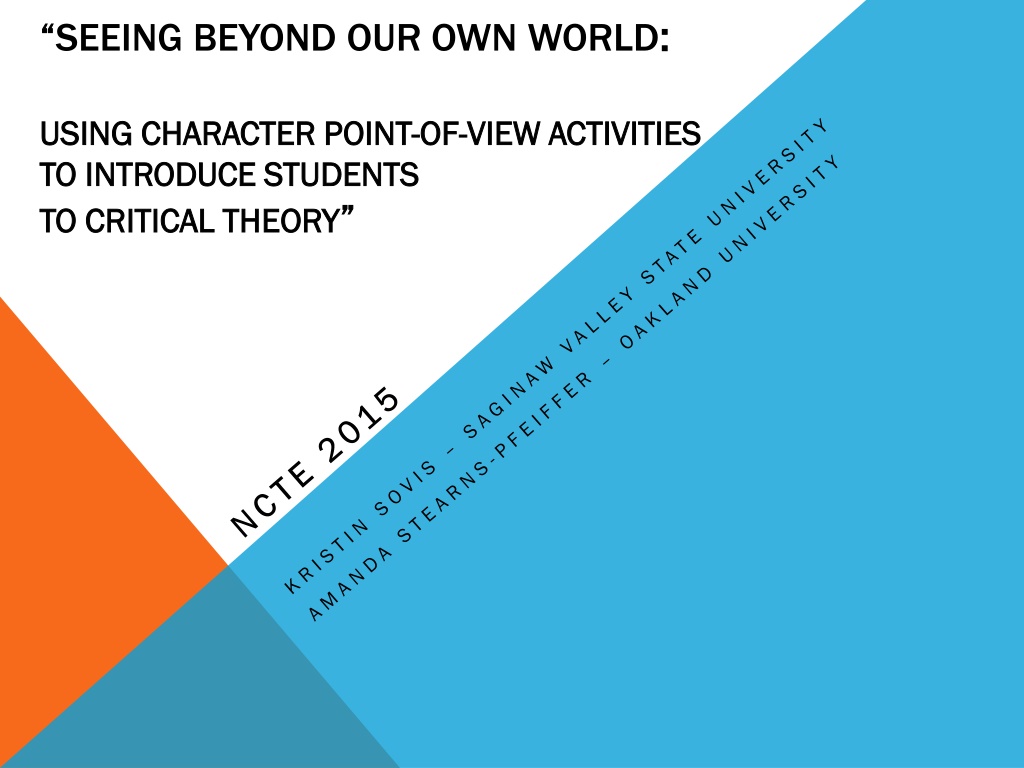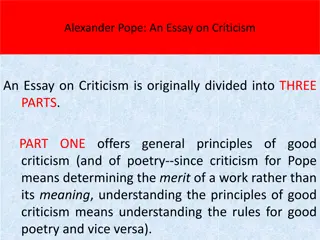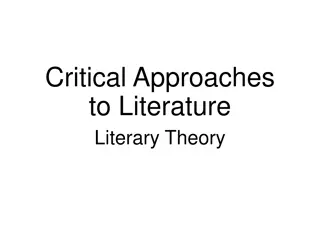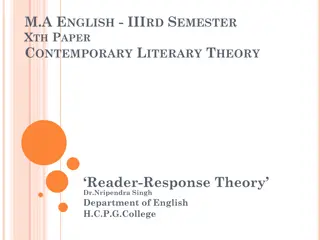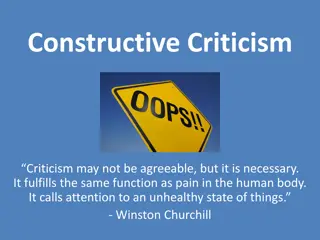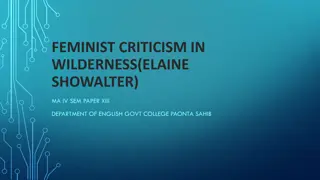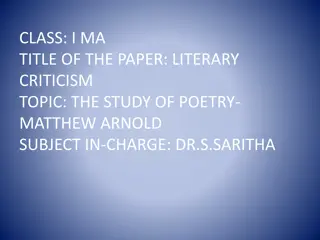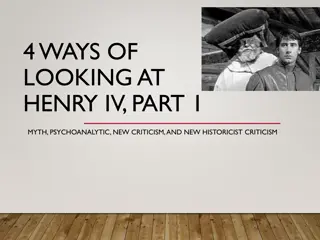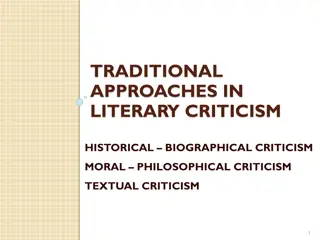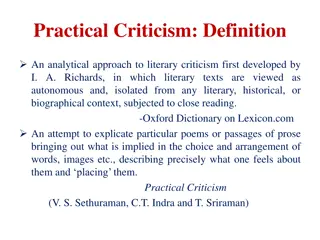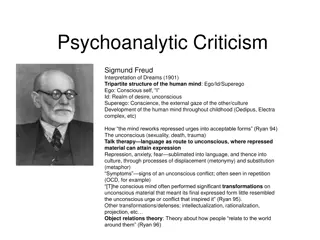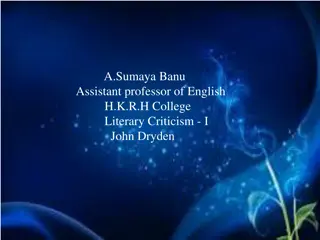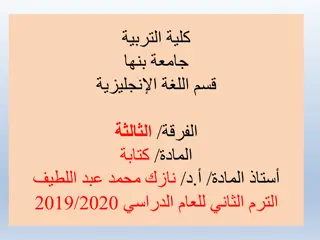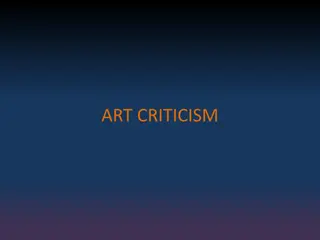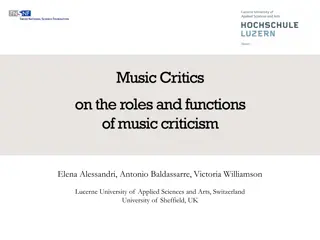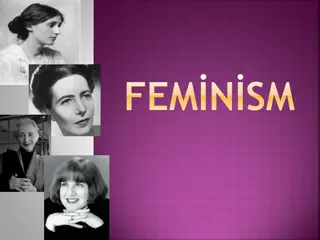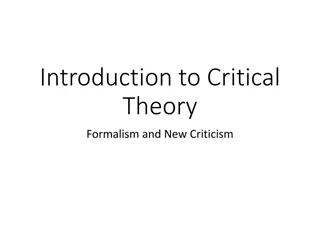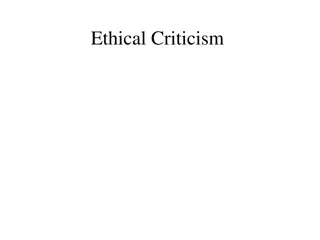Exploring Critical Theory Through Literary Criticism and Analogy
Delve into the realm of critical theory through literary criticism, using the analogy of different perspectives on seeing an orange to understand the various facets of analysis like reader response, Marxist/social power, feminist/gender, and psychoanalytic criticism. Discover how critical theory helps us reevaluate our perceptions of the world and influences our interactions with society, media, and personal motivations.
Download Presentation

Please find below an Image/Link to download the presentation.
The content on the website is provided AS IS for your information and personal use only. It may not be sold, licensed, or shared on other websites without obtaining consent from the author. Download presentation by click this link. If you encounter any issues during the download, it is possible that the publisher has removed the file from their server.
E N D
Presentation Transcript
SEEING BEYOND OUR OWN WORLD: : USING CHARACTER POINT USING CHARACTER POINT- -OF TO INTRODUCE STUDENTS TO INTRODUCE STUDENTS TO CRITICAL THEORY TO CRITICAL THEORY OF- -VIEW ACTIVITIES VIEW ACTIVITIES
"Miriams Reflection (The New G ilded Age)"
WHY CRITICAL THEORY, LITERARY CRITICISM? Critical Theory: theories about the ways we see the world. Tries to explain the Critical Theory: theories about the ways we see the world. Tries to explain the values and assumptions that underlie the ways we see the world (and values and assumptions that underlie the ways we see the world (and therefore the ways we read and interpret literature). therefore the ways we read and interpret literature). Critical theory can help us learn to see ourselves and our world in valuable new Critical theory can help us learn to see ourselves and our world in valuable new ways, ways that can influence how we educate our children, both as parents ways, ways that can influence how we educate our children, both as parents and teachers; how we view television, from the nightly news to situational and teachers; how we view television, from the nightly news to situational comedies; how we behave as voters and consumers; how we react to others comedies; how we behave as voters and consumers; how we react to others with whom we do not agree on social, religious, and political issues; and how with whom we do not agree on social, religious, and political issues; and how we recognize and deal with our own motives, fears, and desires (p. 2). we recognize and deal with our own motives, fears, and desires (p. 2). Think of each theory as a new pair of eyeglasses through which certain Think of each theory as a new pair of eyeglasses through which certain elements of our world are brought into focus while others, of course fade elements of our world are brought into focus while others, of course fade into the background (p. 3). into the background (p. 3).
UPON SEEING AN ORANGE Reader Response Criticism Reader Response Criticism Marxist/Social Power Criticism Marxist/Social Power Criticism Feminist/Gender Criticism Feminist/Gender Criticism Psychoanalytic Criticism Psychoanalytic Criticism
UPON SEEING AN ORANGE... *Reader-Response asks What does the orange taste like? *Feminist theory asks What possibilities are available to a woman who eats this orange? Focuses on the oppressive powers (both economic and social) against women. *Marxist/Social Power theory asks Who owns the orange? Focuses on socioeconomic considerations; who has the monetary power in the situation? *Psychoanalysis (Psychological Criticism) asks What does the orange remind us of?
TWO GRAVEYARDS BY SUSAN TEPPER The two small graveyards lay side by side like the bodies they covered. One had fancier tombstones engraved upon that told names and dates, a floral motif, or perhaps a Grecian style urn in bas relief on its fa ade. Some had sweet poetic verse about the dead person. The other graveyard was the slave graveyard with its decrepit unmarked slabs, many about to fall over or already down in the unkempt grass. We went to the graveyards each time we visited the island. This place of the dead it called to us. It took an hour to get there by public bus. The first time we went was shortly after my dad died and both our families were decomposing. We rode the bus in silence aware of each other in a way that was different. Already, too soon, we knew time was thin. That first visit I found a tombstone with my birth date, and the person had my first name. She died from yellow fever. I thought about dying from fever in a hot tropical place without air conditioning, and what that would be like. Then my husband wanted to go get ice cream cones. So we left.
TWO GRAVEYARDS TODAY S FIRST GOAL: R E C O G N I Z E M U LT I P L E P E R S P E C T I V E S I N T H I S S T O R Y. ( I . E . R E A D T H I S S T O R Y T H R O U G H D I F F E R E N T E Y E G L A S S E S . . . ) DIRECTIONS: WITH A PARTNER, CHOOSE ONE OF THE LENSES (MARXISM/SOCIAL POWER, FEMINISM/GENDER THEORY, OR PSYCHOANALYSIS/PSYCHOLOGICAL CRITICISM) AND WRITE TWO QUESTIONS/RESPONSES BASED UPON THAT LENS.
TODAYS SECOND GOAL: Reconsider your previous reader- response to Miriam s Reflection (The New Gilded Age). Directions: Looking back at the painting, write two questions/responses through your chosen lens (either Marxism/Social Power, Feminism/Gender Theory, or Psychoanalysis/Psychological Criticism). How does applying this lens highlight different aspects of the text? What can readers learn through activities like these? How can our students benefit?
NATURAL INTERPRETATION VS. CRITICAL THEORY Even our personal, natural interpretations of Even our personal, natural interpretations of literature and the world we live in literature and the world we live in unsullied by theory theory are based on assumptions, on ways of seeing are based on assumptions, on ways of seeing the world, that are themselves theoretical and that we the world, that are themselves theoretical and that we don t realize we ve internalized (p. 4). don t realize we ve internalized (p. 4). unsullied by
